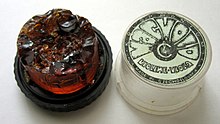rosin
Jump to navigation
Jump to search
See also: Rosin
English
[edit]
Alternative forms
[edit]Etymology
[edit]From Old French raisine, rousine, variants of résine. See resin.
Pronunciation
[edit]- (Received Pronunciation) IPA(key): /ˈɹɒz.ən/
Audio (Southern England): (file) - (General American) IPA(key): /ˈɹɑz.ən/
- (dialectal) IPA(key): /ˈɹɑz.əm/, /ˈɹɔz.əm/[1][2]
Audio (US): (file)
Noun
[edit]rosin (countable and uncountable, plural rosins)
- (organic chemistry) A solid form of resin, obtained from liquid resin by vaporizing its volatile components.
- 1998, Neville H. Fletcher, Thomas Rossing, The Physics of Musical Instruments, 2nd edition, Springer Science & Business, →ISBN, page 284:
- The action of the bow therefore depends almost entirely upon the application of rosin and upon its frictional properties. Violin rosin is a natural gum obtained from conifers such as larch that produce turpentine.
- Resin.
- 1834, [Edward Bulwer-Lytton], The Last Days of Pompeii. […], volumes (please specify |volume=I to III), London: Richard Bentley, […]; successor to Henry Colburn, →OCLC:
- ‘It is delicate,’ said Pansa, ‘but there is perhaps the least particle too much of rosin in its flavor.’
- 1883, Mark Twain [pseudonym; Samuel Langhorne Clemens], chapter 16, in Life on the Mississippi, Boston, Mass.: James R[ipley] Osgood and Company, →OCLC:
- From three o'clock onward they would be burning rosin and pitch pine (the sign of preparation), and so one had the picturesque spectacle of a rank, some two or three miles long, of tall, ascending columns of coal-black smoke; […]
- 1894 [1892], Arthur Conan Doyle, “Lot No. 249”, in Round the Red Lamp […] :
- A thick, fat smoke oozed out from the fire, and a heavy smell of burned rosin and singed hair filled the air.
Synonyms
[edit]Derived terms
[edit]Translations
[edit]solid form of resin
|
liquid resin — see resin
Verb
[edit]rosin (third-person singular simple present rosins, present participle rosining, simple past and past participle rosined)
- (transitive) To apply rosin to (something); to rub or cover with rosin.
- We waited expectantly as the guest violinist rosined his bow in preparation for playing.
- 1979, “The Devil Went Down to Georgia”, in Charlie Daniels, Tom Crain, "Taz" DiGregorio, Fred Edwards, Charles Hayward, James W. Marshall (lyrics), Million Mile Reflections, performed by Charlie Daniels Band:
- The devil opened up his case and he said, "I'll start this show."
And fire flew from his fingertips as he rosined up his bow.
References
[edit]- ^ Hall, Joseph Sargent (1942 March 2) “3. The Consonants”, in The Phonetics of Great Smoky Mountain Speech (American Speech: Reprints and Monographs; 4), New York: King's Crown Press, , →ISBN, § 8, page 99.
- ^ Stanley, Oma (1937) “III. The Consonants”, in The Speech of East Texas (American Speech: Reprints and Monographs; 2), New York: Columbia University Press, , →ISBN, § 11, page 74.
Anagrams
[edit]Danish
[edit]Etymology
[edit]From Middle Low German rosin, rosine, from Old French rosin, from Latin racemus.
Pronunciation
[edit]Noun
[edit]rosin c (singular definite rosinen, plural indefinite rosiner)
Declension
[edit]Declension of rosin
| common gender |
Singular | Plural | ||
|---|---|---|---|---|
| indefinite | definite | indefinite | definite | |
| nominative | rosin | rosinen | rosiner | rosinerne |
| genitive | rosins | rosinens | rosiners | rosinernes |
Norwegian Bokmål
[edit]Etymology
[edit]From Latin racemus, via French raisin.
Noun
[edit]rosin f or m (definite singular rosina or rosinen, indefinite plural rosiner, definite plural rosinene)
References
[edit]- “rosin” in The Bokmål Dictionary.
Norwegian Nynorsk
[edit]Etymology
[edit]From Latin racemus, via French raisin.
Noun
[edit]rosin f (definite singular rosina, indefinite plural rosiner, definite plural rosinene)
References
[edit]- “rosin” in The Nynorsk Dictionary.
Volapük
[edit]Noun
[edit]rosin (nominative plural rosins)
Declension
[edit]Categories:
- English terms derived from Old French
- English 2-syllable words
- English terms with IPA pronunciation
- English terms with audio links
- English lemmas
- English nouns
- English uncountable nouns
- English countable nouns
- en:Organic chemistry
- English terms with quotations
- English verbs
- English transitive verbs
- English terms with usage examples
- en:Gums and resins
- Danish terms derived from Middle Low German
- Danish terms derived from Old French
- Danish terms derived from Latin
- Danish terms with IPA pronunciation
- Rhymes:Danish/in
- Rhymes:Danish/in/2 syllables
- Danish lemmas
- Danish nouns
- Danish common-gender nouns
- Norwegian Bokmål terms derived from Latin
- Norwegian Bokmål terms derived from French
- Norwegian Bokmål lemmas
- Norwegian Bokmål nouns
- Norwegian Bokmål feminine nouns
- Norwegian Bokmål masculine nouns
- Norwegian Bokmål nouns with multiple genders
- nb:Foods
- Norwegian Nynorsk terms derived from Latin
- Norwegian Nynorsk terms derived from French
- Norwegian Nynorsk lemmas
- Norwegian Nynorsk nouns
- Norwegian Nynorsk feminine nouns
- nn:Foods
- Volapük lemmas
- Volapük nouns
